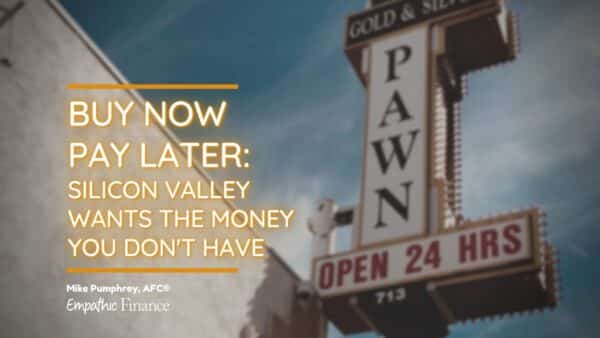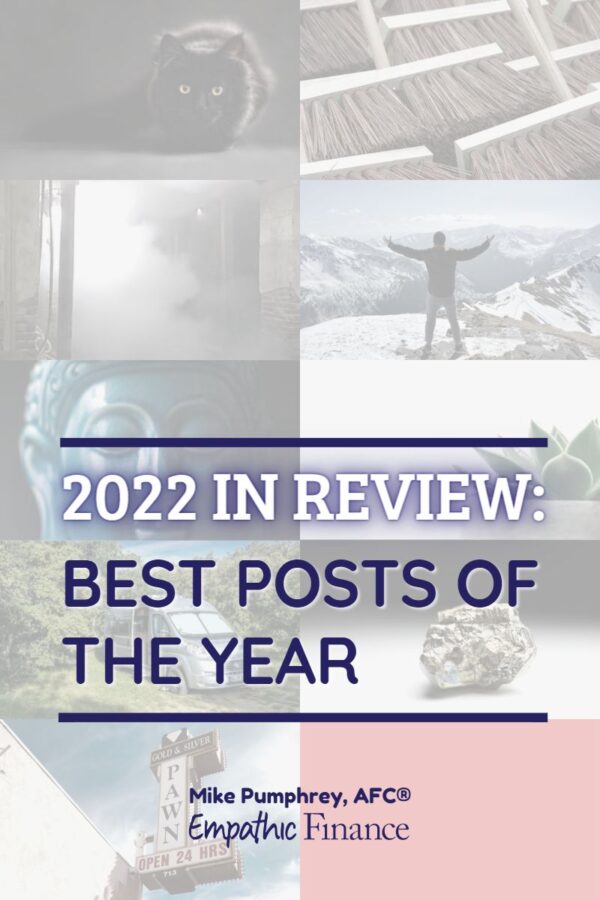I recap the best posts of 2022, including the ones my readers liked and the ones I’m most proud of.
Happy end of the year!
It’s been a good year for me. After more than two years of work, I finally achieved my Accredited Financial Counselor® (AFC®) certification, so I now have something official to back up the decade long career of financial coaching I’ve had.
I had to make some structural changes in my working life, but I was able to continue my coaching practice, and even created something new: my ongoing continuing education class for therapists: Financial Wellness in the Therapeutic Relationship.
And as I’ve done every year for the last ten years, I’ve taken a look back at the themes and ideas of the past year to compile some of what I think are the most notable posts (and the ones I’m most proud of).
I also looked at my site analytics to see which posts my readers (that’s you!) have read the most often, what I think is important is never quite the same as what other people find valuable.
This also has the benefit of giving me a little bit of time off from creating new content, which I do every week, without fail, for over a decade now.
So let’s look back at some hot takes from the year gone by.
Table of Contents
Top posts from readers

5. Is now a good time to buy I Bonds?—With inflation up, a previously boring and overlooked investment from the U.S. Treasury has now started posting outsized returns. One reader asked if this was worth getting in on.
“I personally don’t think that inflation is going to stay high, at least not on any scale that would make this a better scheme than long-term, boring, ho-hum index funds. But that’s just, like, my opinion, man.”

4. How to find out if you have secret savings bonds—Again with the U.S. Treasury, this time it’s a site called “Treasury Hunt” where you can type in your name and info and it will let you know if you have unclaimed savings bonds. The whole thing put me in mind of “The Mystery of Al Capone’s Vaults”, that unlikely 1980’s prime time TV event.
“Ah well. As we all know, there was nothing in Al Capone’s vaults either.”

3. Why Ally’s Surprise Savings is terrifying—A new feature of Ally’s online savings accounts is that it can, with your permission, transfer money out of your checking account automatically if it thinks your money could be “working harder” in your Ally account. This made me worry what would happen if I gave it permission to move my money around. The fact that Ally’s savings accounts are now over 3% (when they were at 0.5% at the time of writing) only makes these questions more urgent.
“And if my checking account interest rate was lower, would it drain my checking account? ‘Yeah, you’re better off with The Purple.'”

2. Going for my AFC Certification: How I got my 1,000 hours—I get messages very frequently from other financial coaches who are also looking for information about the AFC® program. The biggest question seems to be around how you get your experience hours. I decided to be wholly transparent about my own experience, in the hope that it could help others.
“I became a detective in Mikeology. I scoured every historical piece of personal work I could get my hands on, and if there was any way I could justify tying it into relevant experience hours, I submitted it.”

1. Debunking Ben and Arthur: How to win at investing even if you start later—Oh, Ben and Arthur. I get what this Dave Ramsey parable is trying to do: to show you the importance of starting investing early. And while that’s generally true, this story has a fatal flaw in it, which is actually good news for everyone who didn’t start investing at age 18.
“Ben starts saving for retirement at age 19, putting away $2,000 each year for eight years, after which he stops saving any money for the rest of his life. I don’t know why; maybe he decided to to move to an ashram in India or something.”
My top posts

1. Why you don’t charge what you’re worth—I work with a lot of therapists and people who charge for their own services. For people like this, because you don’t rely on a salary, you have to advocate for their own income, something that many people find very difficult to do. But advocating for your own income is one of the most powerful determinants of making a higher income, so we need to tackle what gets in your way.
“You’re not a charity. You’re doing important, life-changing work, work that you’re passionate about that drives you, and likely at the expense of a higher-paying job (that does less for the world). Charging a rate that is commensurate with your experience, and appropriate for a reasonable living wage, isn’t just the sensible way to keep your job sustainable, it’s the right, decent, and honorable thing to do.”

2. Why I don’t talk about FIRE—It’s hard to be a financial professional with an online presence and not get swept up in the FIRE movement, or at least be called to account on why I somehow don’t want people to retire in their 20’s or something. And I do want people to retire whenever they’re able to, I just have some slight issues with FIRE, which makes me unable to be a proponent of it.
“FIRE seems to be saying: ‘live like a pauper now so that you’ll have the ability to live like a pauper for the rest of your life…but at least you won’t have to work!'”

3. Why you can’t invest in crypto—Perhaps this was a little clickbaity. But I wanted people to understand the difference between investing and speculating. I wish more people would have read this, as perhaps fewer people would have subsequently lost their shirts. (This one made quite a dent over on my syndicated Medium page, which makes some sense.)
When it comes to crypto, most people fall into a few categories:
1. “I keep hearing about it, but I still don’t know what it is.”
2. “It’s all a scam; forget about it.”
3. “Wen Lambo??? Laser eyes! Diamond hands! HODL! Mooooooooon!! 🦄🦄🦄”

4. Buy now, pay later: Silicon Valley wants the money you don’t have—This topic made me angry. Some new tech companies have started re-popularizing the “Buy Now Pay Later” method of paying for purchases, in effect reinventing the credit card, layaway, and payday lenders all at once. Because what we all really need is more ways to more easily go into debt.
“If they really wanted to help people achieve financial freedom, they would go out of business immediately, and take their runway money and use it to lobby lawmakers to force minimum wage increases. Or simply give their money to everyone making less than a livable wage.”

5. 93 ways to use your money to support access to abortion and reproductive rights—This year was a catastrophe in the U.S. for bodily autonomy and the rights of women to control their own bodies. Fight back by giving money to organizations who will support reproductive rights. If you’re not sure where to give money, go here and click any of these links. Your support is crucial.
“Abortion restrictions at the state level cost the economy $105 billion a year. So supporting women’s (and all child-bearing people’s) rights is not only the only humane and decent way to exist, but it also positively affects your wallet too. (If you needed that extra boost to get onboard, I don’t care, as long as you’re on board.)”
Looking ahead
I don’t like to do predictions, because they are almost always wrong!
What I will say is that I will keep working to help you make more money, keep more of what you make, and feel better about your whole financial situation. The better off we all are, the better we can handle this late-stage capitalistic system that we’ve all been thrust into. It’s not going to be easy, but it is possible.
Stick with me in the coming year, and I’ll do the same for you.



